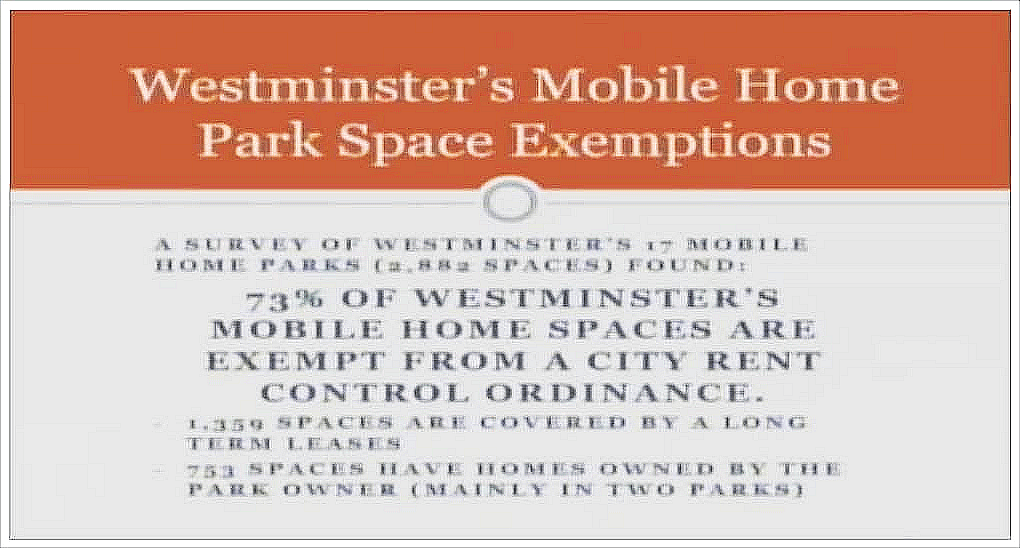Now, will more cities walk through the door?
Notice: as of Dec. 2024, the park owners’ lawsuit against the repeal continues. This clouds the issue and provides an argument that park owners can make to cities – arguing against passing protective legislation. Such lawsuits can take months or years to resolve.
First presented Dec. 11, 2019 for advocacy and lobbying.
Text of proposed repeal of law 798.17 below:
This document is for those that have expressed frustration (as I have) at park owners requiring long-term leases as a condition of owning a home in the park. And how that reduces the possibility of enacting RSOs, and encourages corporate aggregates to buy-up the park, and reduces the possibility of residents turning the park to resident-owned. And how long-term leases may be the dominant form in non rent-controlled parks – that may require some deep legal change. Delete this email as needed.
Attached is Bruce’s 2014 RSO Manual. Sorry, the appendix is missing but someone may have a more recent copy. So this is NOT the copy to be distributed, as it is not finished. Get the “official” copy from whoever has it.
Sections 15 and 16 on page 25/26 cover the recommendation that RSO,s prohibit requiring prospective tenants to sign long-term leases.
The City of Carson has won many, many repeated lawsuits by park owner Goldstein, trying to overturn their RSO, so the local mobile home owner groups seem to think Carson’s RSO is a gold standard.
Carson’s RSO says (emphasis added):
Carson Chapter 7 Mobilehome Space Rent Control
No Park Owner may require, directly or indirectly, that any Homeowner or prospective Homeowner sign a lease or rental agreement that provides that it shall be exempt from local rent control or provides for space rent in excess of that permitted by this Chapter as a condition of tenancy in the park and no Park Owner may deny a tenancy to a prospective purchaser of a mobilehome in the park on the ground that the prospective purchaser will not sign such a lease or rental agreement. (Ord. 91-941U, § 1; Ord. 91-941, § 1; Ord. 92-970U, § 2; Ord. 92-970, § 2; Ord. 98-1130, § 19)
But, it looks like without such an RSO law, the park owner can make a take-it-or-leave-it demand, as WMA indicated that City of Westminster had 73% of mobile home spaces exempt from rent control ordinances.
THE BELOW EXAMPLE IS NOT ABOUT WESTMINSTER, BUT WESTMINSTER IS USED AS AN EXAMPLE OF THE ARGUMENT WMA WOULD MAKE ACROSS THE STATE AGAINST ENACTING RSO’S IN THE MAJORITY OF MUNICIPALITIES.
See WMA’s slide to City of Westminster on 8/14/2019:
Taken from City of Westminster video of the meeting.
https://westminsterca.granicus.com/ViewPublisher.php?view_id=2
Starts at 4:08:00 Slide at 4:11:00
https://westminsterca.granicus.com/MediaPlayer.php?view_id=2&clip_id=450
Doing the math. There are about 2,859 MH lots in 17 parks in non-rent controlled Westminster.
Most of the parks, about 15 of them use long-term leases.
About 47% of the total lots in Westminster are exempt from rent control due to long-term leases.
Another 26% are landlord-owned, in two parks where the landlord is buying up the homes apparently.

Slide presented to Westminster City Council Hearing by WMA, August, 2019. Manufactured homes were mostly exempted from rent stabilization due to 798.17 of the California civil code.
California has about 364,266 MH lots. About 95 of California’s 482 municipalities has an MHP RSO (nearly 20% of municipalities, 144,400 lots) Those RSO’s cover about 40% of CA MH lots. About 80% of municipalities do not have an RSO. And in that 80%, park owners have been requiring long-term leases in most cases. IMHO, this may be the end of new RSOs for mobile home parks unless there is some unusual circumstance. Keep in mind, a number of RSOs have been repealed in recent years (is it 6 or 10?). That’s possibly more than have been enacted in the same time frame. Blame 798.17 for making long-term leases exempt from rent control. There was an attempt in 2016, apparently, by the City of El Monte to repeal 798.17 in its entirety.
Quote: Julie Paule from WMA:
“A few years back, a bill was introduced to prohibit these leases from being exempt from local rent control ordinances. It was swiftly killed in committee and failed to get any real legislative traction.”
I believe that is in reference to the attempted repeal of 798.17.
A 2014 Version of that is here with support from City of El Monte (sponsor), and California Alliance for Retired Americans.
The exemption of long-term leases from rent control laws (any law, whether state or local) is in the earliest MRL versions from the Select Committee’s web site. There is testimony that a surge in long-term lease offerings occurred in 1986 when, apparently, laws changed to exempt leases over 12 months duration.
It effectively allows non-rent controlled parks to work to argue well to prevent rent control from ever happening in the future, as the slide above exhibits. Cities, after considerable struggle, can pass rent control ordinances but only a fraction of current residents will be protected and it could take a decade for the remaining residents to be protected unless they do some kind of sale trick, I don’t know. We don’t have the statistics on how many long-term leases have been signed in both rent-controlled and non-rent controlled parks, but the strategy has been in place by park owners for decades. Remember, the City of Carson law says that long-term leases cannot be required. That does not prevent residents from voluntarily signing long-term leases after they have established residency. Kort and Scott bought two parks in the City of Carson and went door-to-door enticing residents to voluntarily sign long-term leases via offers and “prizes” such as allowed by law. It was only due to watchdog activists and residents of nearby parks that intervened by warning residents about the trap, yet about a dozen reportedly had signed the long-term leases before the intervention.
Another example: Having an RSO does not necessarily mean residents are getting the protections afforded. The City of Santa Clarita has an RSO for mobile home parks. I don’t know how bullet-proof it is. As an example representing the rest of the state, I’m told a park called Granada Villa and maybe even Sierra MHP in Santa Clarita has nearly removed a large number of home owners from rent control protection via voluntarily-signed long-term leases. This is a slow process that adds up over years. If enough residents are removed from RSO protection, it is not a stretch for park owners to ask for repeal of the ordinance that is not in significant use.
To me, this is a baffling situation to get out of. Even a state repeal of 798.17 would not necessarily invalidate the existing long-term leases, only new ones. Our family park had lot turnover at about 10% a year, so it could take 10 years for the existing leases to expire. There may be some other ways out with additional legislation, but it looks complicated. Creative ideas are probably needed.
Summary:
- One path to Resident Owned Parks is promoted as being to, first, have rent stabilization ordinances passed in the jurisdiction. This is said to diminish the willingness of corporate predators to buy the park and increases the likelihood that residents can buy it.
- The park owner attorneys seemed to have thought of this possibility from the beginning, and have an unusual section in the MRL, 798.17, that allows the slow change of a park from potential rent for rent control to exempt from rent control to allow them to make the “it’s pointless” argument to city leaders considering passing an RSO.
- The scenario of park owners demanding long-term leases in non-rent controlled parks has been played out for some time now, exempting most MH homeowners in developed areas from having any immediate relief from rent raises through RSO’s.
- That greatly inhibits the will of cities and the residents themselves from attempting to enact RSOs that the majority of them cannot benefit from until their existing lease expires.
- Even in rent-controlled parks, it seems allowable for park owners to try to persuade existing residents to sign long-term leases, not coerce, but to “sell” them on the idea. Some cash may be paid or items given away as an enticement, such as TV sets.
I would like to be wrong here. Tell me something positive here. It looks like it will take a creative outside-the-box solution to restore the practicality of enacting new RSOs and achieving more ROPs.
I defer to the wisdom of the group.
Additional Documents:
Testimony from 1986 hearing of the Select Committee on Mobile Homes about long-term leases. The surge in leases is mentioned. There’s a lot of background and explanatory information on the why and how of long-term leases.
https://drive.google.com/file/d/1HotboPGn3IzBOvsEdgp7tmJFCbgRsh4v/view?usp=sharing




